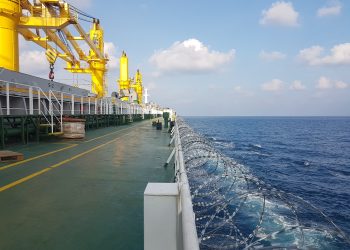70,000 ship movements every year through the Indian Ocean and Gulf of Aden
 Oman is becoming a key hub for the private maritime security market as merchant shipping firms look for ways to combat the pirate scourge that threatens approximately 70,000 ship movements every year through the Indian Ocean and Gulf of Aden.
Oman is becoming a key hub for the private maritime security market as merchant shipping firms look for ways to combat the pirate scourge that threatens approximately 70,000 ship movements every year through the Indian Ocean and Gulf of Aden.
The Somali-based pirates have moved further eastwards in search of victims as international naval forces organised safe corridors of transit along the East African coastline and Gulf of Aden.
Oman now finds itself on the front line in this modern re-enactment of an ancient mariners’ problem, as newly formed private security firms begin to base themselves in ports adjoining the Indian Ocean.
One such firm, Protection Vessels International (PVI), initially based themselves in Salalah, before moving to Muscat as the scope of the challenge has increased every year.
Speaking in an exclusive interview with Muscat Daily, Simon Osborne, Business Development Director at PVI, said that they first arrived in Oman in 2008. “We are the largest maritime security company and started down in Salalah, which was then where the main threat was.”
“As the pirates expanded their operations so did we, as our customers and clients wanted protection further afield. So we have since started embarking teams from Muscat, as there have been attacks close to the Omani coast.”
Authorities in Oman have afforded PVI the opportunity to base their operations for the region in Muscat, said Osborne, with the company recruiting people with specific skills to join their team of security personnel, which is now around 400 strong. Equipment is sourced by PVI, including the import of licensed small arms and other items.
“We are not a land based company. All of our personnel have a maritime background, they are all British and former Royal Marines. They are used to working at sea and understand the rules of the ship’s master,” said Osborne.
“We have authorisation from local governments and Muscat is one of our key ports in that area, as well as Galle in Sri Lanka. It’s not a straightforward process. We have invested very heavily in our network and worked hard to make sure that everything is done properly.”
Many nations previously stood against the concept of arms team boarding merchant vessels in the fear that it would result in ever more violent attack by pirates. This sentiment is beginning to change as lives, cargo, vessel and huge amounts of money are being lost to the increasingly voracious appetites of the modern day buccaneers.
When contacted by Muscat Daily, the United Nations International Maritime Organisation said it was up to each flag-state to determine the best practice for ensuring the safety of the ship, crew and cargo, and what kind of structure that private security companies are given in this regard.
There are signs that shipping firms are utilising armed guards to fend off pirate attacks. On June 24, a statement was issued by the International Maritime Bureau detailing an attempted pirate attack on a merchant vessel that was foiled by the presence of an embarked security team. The incident took place just 74 nautical miles east of Ghalat, Oman.
Osborne was sure that until a solution was found onshore in Somalia, the scourge of piracy would continue. PVI had embarked security teams on board more than 1,000 transits, fighting off pirates on more than 20 separate occasions and no ship under their care has ever been hijacked.
“We are responsible to our customers, the shipping companies. They are the ones who are keen to protect their crews. Given the costs associated we would argue that a professionally trained, drilled, well equipped team is the best defence against pirate attacks,” he said.
Source: Maritime Security Asia




























































